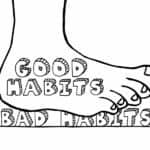It feels like you’ve tried everything. You have many great ideas, but they don’t seem to stick with you. It can be so frustrating when it looks like your life is getting worse and not better. You are going in a perpetual circle stuck in the same pattern over and over again, and you are ready for something different.
Changing a habit is difficult, and when considering any change that has meaning to you, it is worth looking at the impact it will bring.
How you make the change happen despite the difficulties we all face trying to take on new habits or behaviors will determine your success. Understanding the process of change helps you know what to expect and will significantly influence your success.
4 Stages Of Changing A Habit
Research has shown four stages in any change: pre-contemplation, contemplation, and preparation, which leads up to the final stage, action.
Phase 1 : Pre-contemplation
Pre-contemplation is the stage when you aren’t even thinking about changing a habit or your behavior because you feel they are just fine as they are. You may not be happy with your life, but it doesn’t occur to you that things could be better if only something changed a little bit.
You defend your behavior or habit when others bring it to your attention. Overall, you are comfortable with what you are doing and don’t see any issue with what you are doing.
For example, you stay up late every night, getting only a few hours of sleep. You feel tired, grumpy, and numb the next day; however, it does not occur to you that going to bed earlier and getting a good night’s sleep will have any impact. You defend staying up late as the only time of day you get time just to be, to not be bothered. You enjoy the solitude and quiet of this time.
Phase 2 : Contemplation
Contemplating change means that you are at least starting to consider whether your current behaviors might need updating or adjusting somehow. Let’s carry the sleep example from above through this phase.
Time passes, and your realization that you are always tired, grumpy, and numb is becoming more apparent to you, and it is not what you want in your life, but you still enjoy the solitude and quiet time and wonder how do I keep my solitude and quiet time and get more sleep?
You might begin by researching strategies for a change or looking at how other people have succeeded with changing a habit or behavior that no longer serve them.
Phase 3 : Preparation
So you want and choose to change. Some people may decide that (insert the change here) will change and poof the next day the change has taken place. This poof is rare for most of us. It is a process we need to prepare for, not a moment in time. Change takes time and preparation.
We may make decisions quickly without preparation, such as the New Years’ resolution; I will exercise daily for 1 hour, and over time our resolve may begin to fade. We exercise daily for 1 hour, then month two 1 hour every other day, then 20 minutes every other day. Or we begin to miss day and stop exercising all together. I am sure you have an experience that is similar to this.
When you realize it takes time moving from one stage to another, then understanding why change happens so slowly will help you to mentally prepare yourself that the things you want to be different in your life will not happen overnight; it is a process. You will need to explore the new habits before you commit to them.
Change is ongoing, whether small changes like changing clothes or significant changes like moving away from home or ending a relationship. Unfortunately, some people think they should never make any changes because they’re afraid of what might happen. Still, there are huge advantages of embracing change, including being open-minded, loving yourself, and having adventures.
Phase 4: Action
Lastly is the action phase to make the change happen.
Once you have prepared for your changes and know what they will look like, it’s time to do something about them! The final stage, action, is where you commit to following through with the plan you created to change.
When you first begin the action phase, you will be hypersensitive to everything associated with the change.
It’s Hard To Change
It is hard to change, but it doesn’t have to be that way. Change is challenging because our brains are wired for stability and predictability. If we were machines, we could be programmed or designed for constant shifts in direction and change.
So when we decide to make a change, whether big or small, there’s usually some resistance from the brain and other parts of the body. Change is challenging not just for us but also for our loved ones and friends, making it even more difficult. The only way around this is to ensure you’re communicating with them about changes you want to make so they know how important those things are to you.
In addition, it’s a good idea to set some boundaries for those who are not supportive of your making changes. It is challenging enough to deal with your internal thoughts and feelings and having people who validate your negative thoughts will not help you with the change process.
How To Prepare For Successful Change?
Write down your thoughts and feelings in point form, as this can help ensure that you make a clear plan for how the change will happen and will help you focus on what’s important to you. Be truthful to yourself by answering what you think and feel, not what others think you should.
If the words I should or I could arise when doing this exercise, know that you are not tapping into your feelings.
To help you out with this process below is a series of questions to utilize.
- What change do I want to make?
- Is this a significant change or a slight change?
- How will making this change impact my life?
- How will my life look if I make these changes? Close your eyes and visualize what your life will be like when these changes are complete.
- What boundaries will I need to create to make this change.
- Who are the people who will support me in making this change?
- Who are the people who will not support me in making this change?
- Will I need outside my circle support in making this change?
- What skills or knowledge do I need to make this change?
- Where can I obtain the skills and knowledge I need to make this change?
- What time commitment will this change take?
- What financial commitment will this change take?
- Why do I want to make this change?
- What are the positive outcomes of this change:
- What are the negative outcomes of this change:
- How will I cope and deal with the discomfort of this change: socially, spiritually, mentally and physically? g. use of meditation, counseling, journaling, relaxation, exercise, mindfulness.
- Do I need to strengthen my coping mechanisms or do I need to learn a new coping mechanism?
- What thoughts and feelings do I have about this change?
- Fear = When I think about this change I fear____________
- Anxiety = My anxiety increases when I think _____________ , about this change
- Weepy = When I think about this change, I cry at the thought of__________
- Happy = When I think __________________, about this change I feel_____________
If you have completed the preparation and questions above, you will see the challenges you face.
You will know why you want to change, what you think about it, the challenges you will meet, and successfully overcome the obstacles.
For example, have you ever researched a topic such as a vehicle? The one you wanted you never saw many around on the street. Then the day you purchased the car, you look around, and all you see is the vehicle you bought everywhere?
If you want to reduce the amount of caffeine you drink, you may notice that your plan to reduce from 6 cups to 5 cups results in feeling a bit more tired or agitated. Your stomach may growl more. You may internally try to talk yourself into starting tomorrow.
Remember in these moments to access your plan to try new coping mechanisms. This hyperarousal is there as everything is unique to your body and mind and requires an adjustment. The necessary energy and focus from you regarding this change will lessen over time as the change becomes a part of you.
How Long Does It Take For Change?
The time frame for the transition becoming a part of you will vary from person to person as we each have unique challenges. However, in general, after 3 to 6 months, the change will be a part of who you are.
It is common to fall back into your old ways and let the change you wanted to pass – this is called a relapse. It happens. Show yourself some compassion, review what happened, and revamp your preparation plan to include the new information you have and what you will do differently this time.
Then start again.
Strategies on how to make change more accessible?
The first step is to know why you want to make the change and set specific goals.
- Find support and accountability in people who care.
- Find a therapist, coach, or mentor that can help guide you and connect with others who have made similar changes in their lives.
- When we practice accountability, it helps us keep our commitments going which makes changing easier.
- Assess your coping mechanisms.
- Recognize you want the change.
- Think about the change.
- Acknowledge that change always has some initial discomfort associated with it. Still, over time, when we start feeling better about ourselves or living the life we choose, then the benefits outweigh any temporary unpleasantness from making changes in our lives for the better.
- Ensure you have completed the preparation phase so you know how you will deal with the discomfort of the change.
- Start with small actions/steps/goals such as cutting down from three cups of coffee to two instead of focusing solely on big goals that seem impossible right now.
- Think about what is realistic and relevant based on other commitments you have, as this will make changing so much easier.
- Take the time to schedule the change into your current routine. Do you have room and time to make this change? Are you willing to give up time doing A so that you can use that time for the change you want?
Some alternatives to explore to increase your coping mechanisms can be found in our personal growth guides:
Final Thoughts
There are many reasons why changing a habit or routine might feel too big of a task at any given moment in time. Change can be much more complex than you think, and often, the difficulty of change has us backing away from what we want for our lives.
In addition, our life experiences, beliefs, and skillsets vary, so change can contradict everything we know, making it complicated.
When facing challenges, it’s essential to have some strategies that make the process easier because no matter how difficult making changes can be, they are worth doing. Change isn’t always fun and sometimes feels downright scary. However, there is something about knowing that we changed our lives that will improve our self-esteem, belief in our abilities, and ability to make other changes.
Small steps lead to the significant changes we desire, and it is achievable. Success comes about from the action we take when no one is watching us. The little things we do for ourselves will bring tremendous change and joy to our lives.
The actions you take when no one is watching, is the action that brings about true change.






